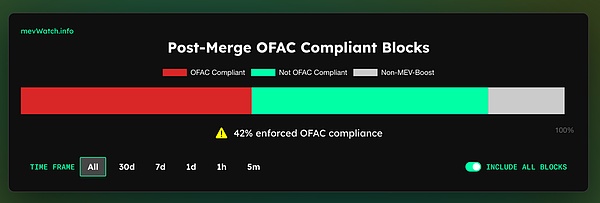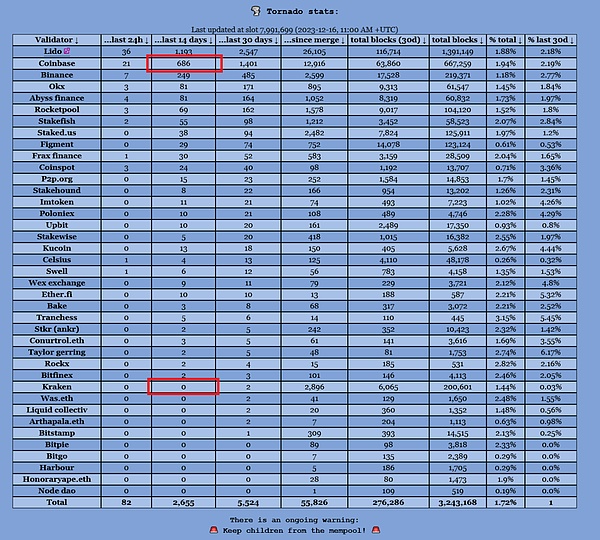In the Ethereum blockchain, approximately 42 % of blocks reviewed wallet addresses included on the U.S. Treasury Department’s Office of Foreign Assets Control (OFAC) Specially Designated Nationals List (SDN List). In other words, these blocks will exclude or block transactions from wallet addresses that appear on the U.S. sanctions list. Earlier this week, the proportion of blocks performing such censorship was even closer to 50%. This shows that about half of the blocks in the Ethereum network are performing some form of transaction review according to the US sanctions list.
Unlike permissionless crypto networks like Bitcoin, OFAC-compliant relay nodes on Ethereum review wallet addresses that appear on U.S. sanctions lists .
The Maximum Extraction Value (MEV) tool MEV-Boost from Flashbots - these wallets are censored by default and many relay nodes use their default settings . MEV-Boost also outsources the block production of validators to a third-party market operated by itself, maximizing returns through quantitative trading strategies such as pre-trading, post-trading, and pinch trading, which may utilize ordinary Ethereum. user.
Some examples of MEV-Boost relay nodes include Flashbots (the largest so far) as well as BlockNative, Manifold, Eden, BloXroute Max Profit, BloXroute Ethical, and BloXroute Regulated wait.
This means that when transactions are processed by Ethereum relay nodes (nodes responsible for disseminating transaction and block information) using MEV-Boost software, they Automatically filter out transactions from wallet addresses listed on the U.S. OFAC's Specially Designated Nationals List (SDN List). Therefore, transactions from these addresses will not be included in the blockchain. Many relay nodes may choose to use MEV-Boost's default settings, thereby implementing this censorship mechanism in their operations.

(Image courtesy of Mev Watch)
Relay operators complying with U.S. sanctions scrutinize which users can broadcast transactions on the Ethereum blockchain. Of course, those users who have been sanctioned by the U.S. Treasury Department’s Office of Foreign Assets Control (OFAC), even if they cannot go through OFAC-compliant paths (such as certain cryptocurrency exchanges or verification nodes), they can still try to go through other non-OFAC-compliant paths. to execute their transactions. In other words, these users may look for trading platforms or network nodes that do not comply with OFAC sanctions to complete their blockchain transactions, because these platforms or nodes will not filter or reject transactions based on OFAC’s sanctions list.
For example, Coinbase, Tornado Cash was sanctioned by the US government last year for providing currency mixing services to North Korea. But according to data from Tornado Warnings, Coinbase has verified 686 transactions related to Tornado Cash in the past two weeks. As a verification node on the Ethereum network, Coinbase confirms and adds these transactions to the blockchain.

This table shows how many blocks each validator proposed, including transactions that interacted (deposited or withdrawn) with the Torado Cash contract or TORN of all denominations. Source: Toni Wahrstätter
This is a bit embarrassing for OFAC, as it seems that he turned a blind eye to Coinbase's actions. However, these contract interactions are clearly visible on the chain. It is expected that OFAC will need to face this issue and make decisions sooner or later. This is also a relatively large potential impact on Coinbase and Ethereum.
 JinseFinance
JinseFinance









